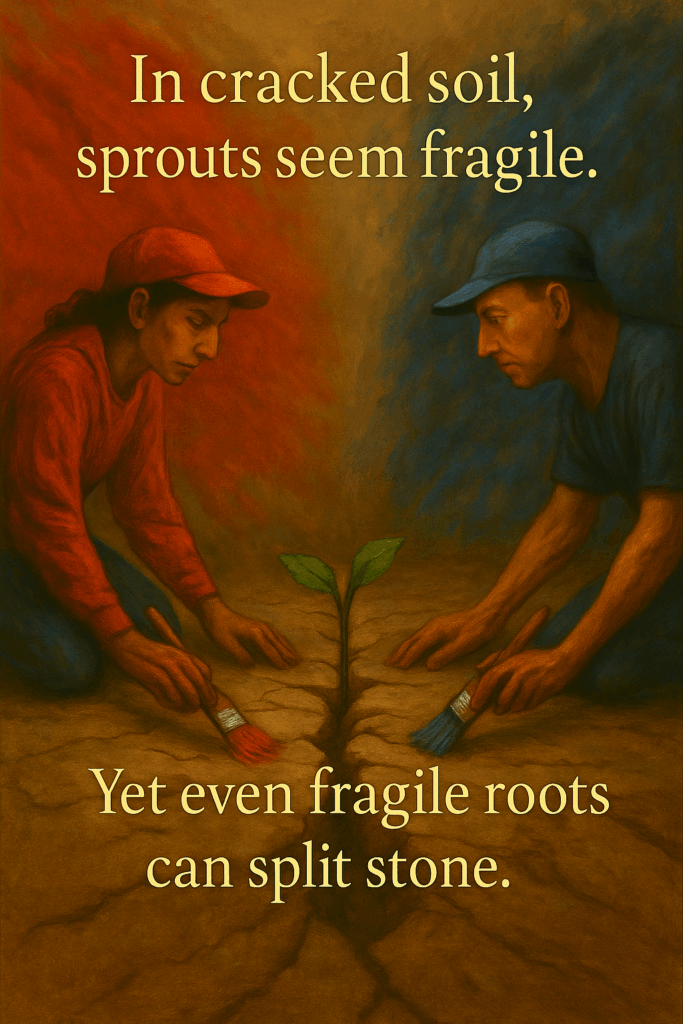
The late July dusk settled over Crestview High, its cracked courtyard bathed in the faint glow of a lone streetlamp. Inside a scuffed classroom, Aisha sat at a worn desk, the seedling from Emil’s visit rooted in a clay pot before her. Its leaves, fragile yet green, reached upward—a quiet defiance in a place hardened by division. Beside it lay her notebook, her new ledger, with jagged but honest entries from students who had dared to speak their truths.
Her fingers brushed the seedling as she replayed the day’s fragile victory. A lunchroom fight had erupted between the Red Jackets and Eastsiders over a stolen phone. The Red Jackets demanded fairness, accusing the Eastsiders of hoarding privilege. The Eastsiders defended order, calling the Red Jackets reckless troublemakers. Shouts had nearly turned to fists—until Aisha, clutching her notebook, called for a pause.
Using the Accord’s three-minute rule, she gathered both sides, each voicing their story while the others listened. The ledger captured their words: “They act like they own everything.” “They just want to tear it all down.” Out of that tension, a sprout appeared—a plan for a shared mural on the courtyard wall. The Red Jackets painted bold colors, symbols of change. The Eastsiders shaped clean lines, symbols of order. It wasn’t peace, but it was a sprout.
Yet shadows lingered. Mr. Vance, the history teacher, had scoffed at her efforts. “Kids playing at politics? Save it for the debate club, Aisha.” His dismissal echoed what Grandfather Tomas had once warned Emil: when people think only in rigid camps—left versus right, us versus them—they turn differences into division.
That night, Aisha typed a message to Emil and Priya:
“The seedling’s growing. We stopped a fight with the ledger. Red Jackets and Eastsiders painted together. But some—teachers, kids—cling to their sides. It’s like they want the split. How do you tend when the soil’s so cracked?”
Priya’s reply was quick: “Call us. Let’s graft this soil together.”
Aisha set her phone on speaker. Emil and Priya’s voices filled the room, the seedling standing as a silent witness in the lamplight.
“Your message sounds like our greenhouse after the fire,” Emil said. “Tell us how it unfolded.”
Aisha recounted the clash. “The Red Jackets want fairness for everyone but shut down dissent, calling others ‘elite.’ The Eastsiders want stability, but push out anyone who questions them. I gave them three minutes each—no interruptions. They wrote in the ledger, then painted together. But Mr. Vance says it’s pointless, like we’re pretending to be leaders.”
“That’s the Four Absences at work,” Priya said firmly. “Absence One—Exclusion. Absence Three—Dehumanization. By labeling each other ‘privileged’ or ‘chaotic,’ they erase stories. Your ledger gave them a circle of fairness, even if Vance can’t see it.”
“But what if it’s not enough?” Aisha pressed. “Governments are supposed to manage differences. All we have is a mural and a few pages. Emil, you wrote to the UN about wars—Ukraine, Palestine. Our cliques feel like that: one side crying for justice, the other for order. But what if some soils—here, out there—are too cracked to ever soften? Why plant at all?”
Emil’s pause was heavy. “Grandfather told me some hearts cling to camps because change feels like a storm. Leaders bomb cities for power; teachers scoff at new sprouts. But planting isn’t about fixing everything—it’s about proving that growth is possible. Russia dehumanizes Ukrainians. Palestinians’ cries are dismissed as noise. Yet even in those cracks, sprouts appear—dialogues, protests, acts of courage. Your mural is one of them.”
Priya’s voice softened. “Your ledger grafted their strengths—Red Jackets’ passion with Eastsiders’ stability. That’s what governments should do. We’re planning a city summit. Bring your ledger, your seedling, your mural’s story. Show them what you did.”
Aisha hesitated. “Our mural’s just paint on a cracked wall. You think it can stand next to your greenhouse?”
“Yes,” Emil said with conviction. “Cracks let light in. Bring it. Plant with us.”
A quiet resolve settled over Aisha. “Alright. I’ll bring the ledger, the seedling—maybe even some Red Jackets and Eastsiders. But don’t expect them to agree easily.”
“We don’t,” Priya said, her smile audible. “We expect keepers.”
Ledger Entry — July 29: Sprouts in Cracked Soil
Symptom: A lunchroom fight between Red Jackets and Eastsiders, sparked by a stolen phone and clashing cries for fairness and order.
Disease — The Four Absences:
-
Absence 1 (Exclusion): Red Jackets shame dissenters; Eastsiders shut out challengers.
-
Absence 2 (Vengeance): Both sides seek to “win,” fueling blame.
-
Absence 3 (Dehumanization): Labels of “privileged” or “chaotic” erase stories.
-
Absence 4 (Unheard Cry): Justice and stability unvoiced, left to fester as conflict.
Investigator’s Response: Applied the ledger and three-minute rule, channeling conflict into a shared mural—blending vibrant change with ordered structure.
Outcome: Shared work softened divisions. Ledger restored voices. The seedling grows; the mural stands.
Note: The fire brigade halts a fight. The gardener plants a seed. Sprouts rise even in cracked soil, fragile yet defiant.
Home Again
That evening, Emil and Priya told Grandfather about Crestview’s progress. Emil’s voice carried both hope and hesitation. “They listened, Grandfather. The fight became a mural. But it feels fragile. One harsh word, and it could all fall apart.”
Grandfather’s eyes softened. “Of course it feels fragile. Sprouts always do. But remember, Emil—governments, cliques, even nations all begin as fragile sprouts. What matters is whether they are tended, or trampled.”
He tapped the ledger gently. “The Red Jackets cry for fairness. The Eastsiders cry for order. Both are needed. A just gardener grafts them together, circling them with care. That is the work of leaders—in schools and nations. Do not despise fragility. It is the sign that life has begun.”
Emil sat back, the basil leaf pressed in his ledger a quiet reminder. The soil was cracked, but sprouts had pushed through. And perhaps, just perhaps, they could grow into a circle of fairness wide enough for a city—or even the world.

